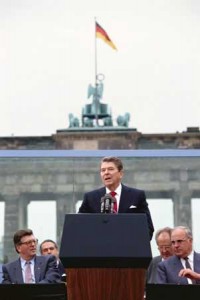In 1963, John F. Kennedy delivered his famous “Ich Bin Ein Berliner” speech at the Brandenburg Gate in Berlin, Germany. Twenty-four years later, at the same spot, Ronald Reagan famously said, “Mr. Gorbachev, tear down this wall.” President Barak Obama, spoke this week at the same Gate where he hoped to regain some of his political mojo. He called for a worldwide reduction in nuclear stockpiles. In the theoretical world, a universal reduction in nuclear weapons is a good thing. But in the real world, there are nations that will not agree to such reductions and others that are currently seeking and acquiring them.
The idea that America should disarm in hopes of setting an example for other nations is dangerous and naive. We are not safer, if only the U.S. has fewer nuclear weapons. In fact, the rest of the world is not safer. If we can create verifiable and enforceable international agreements to reduce nuclear weapons, it would be worth considering. But if only the U.S. is disarming that is pure lunacy.
The same could be said for an international trade issue currently facing Congress that has garnered much political debate. Many nations heavily subsidize their home industries. The U.S. doesn’t do this, nor should it. Taxpayers should not be made to bear that cost. Many nations also do more subtle things to tilt the economic playing field in their favor. China, and many European and South American nations, for example, offer aggressive, below market loans to induce foreign buyers to purchase their goods.
When the U.S. competes on quality and price, it wins. That is precisely why many nations — like China, France, Brazil and Russia to name only a few — intervene on behalf of their “home” corporations and offer cut rate financing so that they can undercut U.S. Firms and win contracts. American companies often must compete not only with foreign corporations, but with foreign governments who provide their companies with direct aid and cheap financing.
The U.S. Export-Import Bank assists U.S. manufacturers – large and small – to export their goods to foreign buyers. However, the U.S. Export-Import Bank does not offer cut rates or aggressive loans, or give grants. In fact, the Ex-Im Bank does not compete with private sector lenders. The Ex-Im Bank simply provides economically sustainable loan guarantees where they are not otherwise available. In this way, the Ex-Im Bank fills-in banking gaps so that U.S. goods can be exported to nations where commercial financing is insufficient or underdeveloped.
The Ex-Im Bank has a 75 year track-record. Since its inception, less than 2% of the Bank’s loans have ever defaulted which is better than most private sector lenders. Because highly valued manufactured goods are part of the collateral for the loan, the risk is very low even in the event of a default. For this reason, the Ex-Im Bank doesn’t cost taxpayers a dime. The Bank is self-sustaining and returns money to the U.S. Treasury – last year alone, more than one billion dollars.
Even with this strong record, Congress significantly enhanced Ex-Im policies in 2012 when the Bank was reauthorized. There is now greater transparency, more robust congressional oversight, and more rigorous economic impact analysis. Moreover, U.S. Treasury officials are required to work with foreign governments to improve free trade agreements and reduce and hopefully eliminate the role of government export credit agencies. This is important because in the best of all worlds, the Ex-Im Bank would be unnecessary.
Some conservatives oppose the Ex-Im Bank. As a rock-ribbed conservative, I understand their concerns. In an ideal world, we’d have free trade agreements across the globe, and other nations would not be using their industrial policy to tilt the playing field in their favor. However, if we unilaterally abolish the Ex-Im Bank without having verifiable and enforceable agreements with other nations, we are effectively engaging in unilateral economic disarmament. Just as unilateral nuclear disarmament is naive and dangerous, unilateral economic disarmament will have real economic costs to America.
Manufacturing supports more than 17 million U.S. jobs. Almost 88% of the Bank’s transactions in 2012 went to small businesses. Even the transactions that involve big name firms like Boeing, Caterpillar and GE, involve tens of thousands of small “invisible” exporters or small businesses that supply parts and services to the big companies.
If we engage in unilateral economic disarmament, thousands of American businesses will effectively be locked out of many emerging nations where traditional commercial banking isn’t yet developed and where our economic competitors have the direct aid and support of their host governments.
So to my conservative friends, I say, you’re right that the entrepreneurial dynamism of free markets is powerful and government interference in the marketplace is counterproductive and costly. We need a government that spends less, interferes less, and taxes less. We must expand free markets and increase trade. We must reform our tax code and our regulatory regime to ensure America is competitive.
But abolishing the Ex-Im Bank now – without international financing reform agreements – does little to promote free markets. It is essentially unilateral economic disarmament, which like unilateral nuclear disarmament does nothing good, and a great deal of harm.
. . . . . . . . .
George Landrith is the president of Frontiers of Freedom, an organization founded by the late U.S. Sen. Malcolm Wallop, R-Wyo, and a graduate of the University of Virginia School of Law, where he was Business Editor of the Virginia Journal of Law and Politics. This article was originally published at The Blaze.
